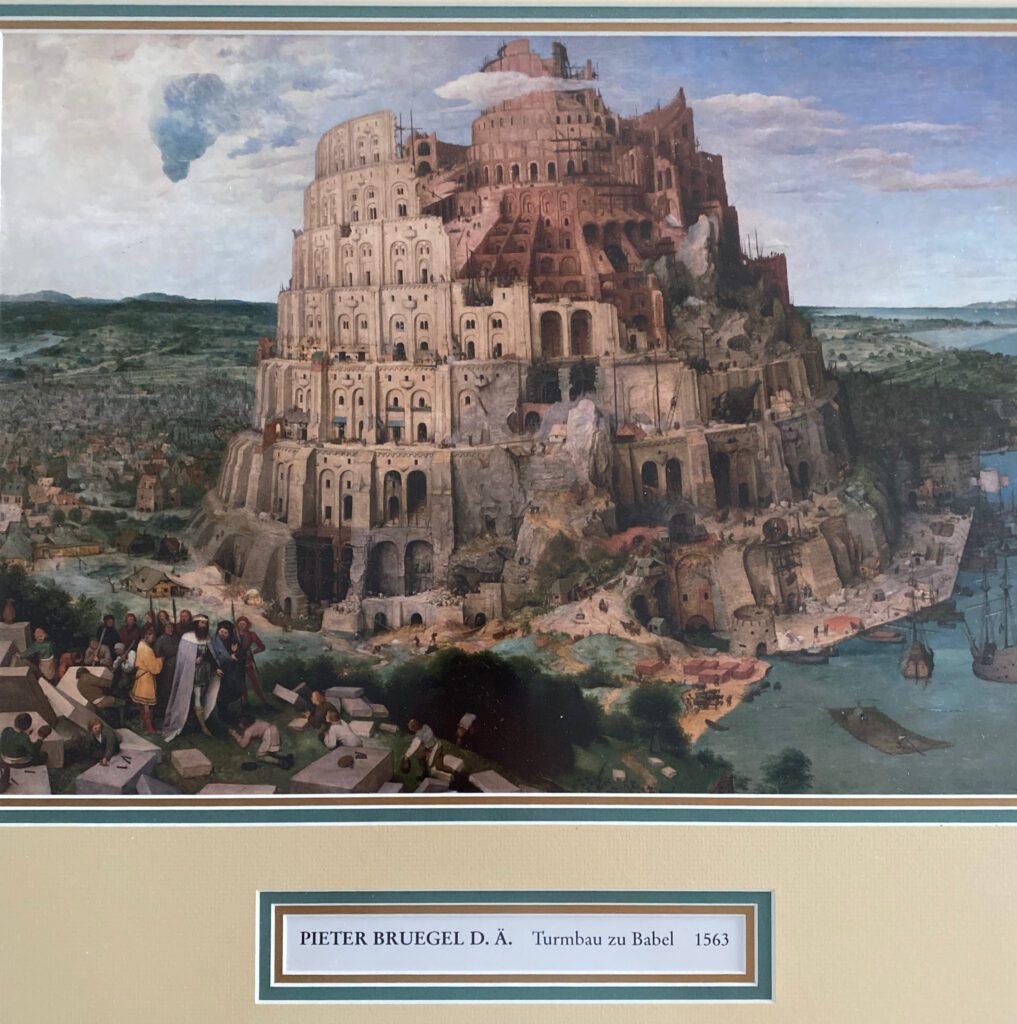It seems the dysfunction in communicating with each another; of hearing one another; or looking to gain a sense of understanding with one another is a centuries old phenomenon playing out with increasing intensity in today’s political environment. I was reminded of this when I checked out a recently published book, The Power of Our Language by Viorica Marian, at our local library. The first few paragraphs of her Introduction used Peter Brugel’s renowned painting, The Tower of Babel, to make a point and brought me back to a visit to the Historical Art Museum (Kunsthistorisches Museum) in Vienna, Austria where the original painting graces its walls.
The short version of the story behind the painting is that God considered it blasphemous to build a tower to the heavens, so he created multiple languages dividing people into linguistic groups, rendering them unable to understand one another. The result was a palatial building that went sideways instead of up. I purchased a print of the painting at the museum, had it framed when I returned home, and it hung it in my office as a high school principal. It sometimes provided a reference point for centering discussions to build common understandings as we worked with students and each other to make teaching and learning more constructive.
Today, our democracy seems to be moving sideways, perhaps our version of Tower of Babel, due to an increasing inability to speak with one another. In a recent Atlantic Magazine article entitled, “Do You Speak Fox?”, Megan Garber describes our current state of discourse as both a national and personal crisis. She writes that Fox uses two pronouns, “you and they…that you are under attack, and they are the attackers.” She notes that Fox language includes words like mob, socialist agenda, hoax, and invasion or open borders… and it’s continually a language of grievance.
I’ve always been a believer that the language we use creates the culture in which we live, including the governance and political culture that impacts our everyday lives. We have gone through a multitude of political seasons hearing of ‘the culture wars’, which seem to have simply spawned a series of tribal-like talking points or cliches that tend to create limits or demand we take sides for the bigger ideas that become central to starkly different political ideology and governance. We have the war on woke or political correctness, the war on socialism, the war on religion, the attack on The Second Amendment…and so it goes on and on.
Now have the war on reading, where a program called “the Science of Reading,” is in some cases using cherry picked pieces of reading research to promote practices that proved popular in the mid 20th century. Popular is the key word, because it seems that whether it’s an emerging reading program or a history curriculum evolving in states like Florida and Tennessee, key decisions for schools that center on teaching and curriculum are more and more being pushed through as political talking points rather than sound or ethical judgement and expertise. The language used on the political side of the decision process is shifting the culture of school governance and teaching…and not always in a positive way for impacting students and learning.
To be clear, there are some research based components to the Science of Reading Program, but when any process for adopting an educational program becomes political, it reverts to the culture wars of them vs. us. Words like compromise and tolerance have distinct, but conflicting meanings depending on whether one lives in a culture of inclusivity or exclusivity. When a reading program is heavy on phonics at the expense of comprehension and context, it’s an exclusive program limiting learning and thinking. Without the conversations to Include important elements of reading instruction, that curriculum moves sideways. A history curriculum built on omitting key truths moves sideways. Beyond classrooms, when a journalist is described as an enemy of the people rather than a person reporting the news, our democracy moves sideways.
For years politicians on one side of the isle have preached the concept of ‘trickle down economics’ that has essentially failed to make its way to main street America. Absent of significant wide ranging benefits of such policies, it does seem that the only trickle down benefits of our political behavior and action has been a language of divisiveness that has “rendered us unable to communicate and condemned to mutual incomprehension.” We struggle more to foster a collective meaning that leads to stronger communities. Instead of political system that encourages a democracy of consensus and compromise, we have one who continues to move us sideways, creating our own Tower of Babel, both figuratively and literally.

This is a really thought-provoking piece. I especially enjoyed learning how Brueghel’s painting was a daily reminder to you when you were a principal. Having visual touchstones in the whirlwind of school days is such a good idea. And I agree with you completely: “We struggle more to foster a collective meaning that leads to stronger communities.” It doesn’t seem possible to respectfully agree to disagree anymore, and the middle ground has become extinct. Everything is, indeed, going sideways.